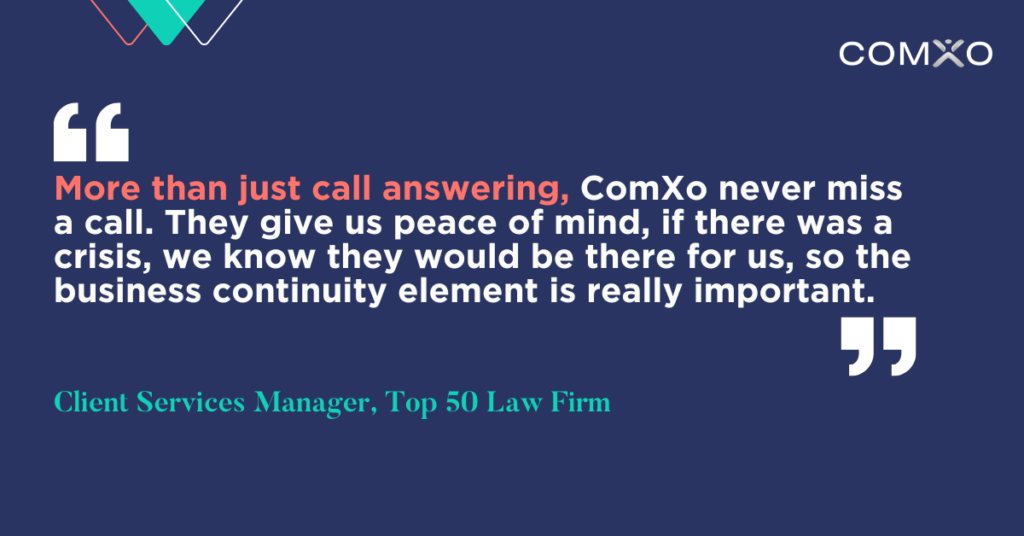Why being prepared for the day-to-day matters
No company likes surprises (unless, perhaps, it’s a sudden stock price jump). Which is why it’s important to have strong contingency plans for when things go wrong. According to CityAm, cyberattacks on law firms have risen sharply over the last year, and this will likely continue as hackers recognise the potential value of sensitive client data.
Most law firms have plans in place for worst-case scenarios – a serious client data breach, I.T. system failure, or legal liability. But despite the increase in ransom attacks, these incidents are still (thankfully) not day-to-day occurrences.
However, business continuity is about more than just being prepared for a rare catastrophe. Threats to the continuity of your business operations are usually much smaller, more frequent, and easier to overlook, but their effects add up over time. From a sudden bout of winter sickness to a power-cut to something as seemingly innocuous as a fire alarm, there are multiple scenarios that can render a law firm less able to provide seamless customer service for a short period.
Given that up to 40% of calls to full service law firms are new business enquiries, even short periods of downtime can cost your firm valuable business. Preparing for day-to-day disruption is your best chance of remaining accessible and efficient, both for your existing clients and potential future ones.
Here’s why being prepared for the little things can make a big difference for your firm.
Daily disruptions are easy to overlook
If you asked most partners what their business continuity strategy looks like, chances are their answer would mention cybersecurity, I.T. infrastructure, data recovery, or insurance, and would most likely involve a dedicated working team.
Very few would think about what their firm would do if, for instance, there was a fire alarm in the building. Assuming that the reason for the alarm is somebody burning toast in the office kitchen and not an actual fire, this incident might sound trivial – but there are still business continuity implications to consider.
For example, who is answering your phones in this scenario? Will you be relying on voicemail to pick up any potentially important calls that come in during the half-hour before your teams are allowed back into the building?If so, it might be worth considering if this is the right solution for your firm. According to our research, around 60% of people won’t leave a voicemail if they don’t get through – meaning clients will probably pick up the phone to a competitor instead. The impact is also felt by those employees who are working remotely, where friction and frustration from the disruption can impact their own roles and effectiveness.
And it’s not just fire alarms. Everyday disruption also comes in the form of:
- Staff sickness
- Staff holidays
- Power cuts
- Travel chaos
- Flooding and Snow days
- Facilities incidents
- Retirement planning
These are the ongoing small-scale challenges faced by facilities managers and front of house teams as they strive to efficiently resource and deliver great service to clients.
A 2023 BBC analysis of National Rail data showed that nearly half of UK train services were delayed or cancelled in the first half of 2023, with cancellation rates as high as 13%. This means the prospect of front of house teams not making it into the office without disruption is on the increase. Firms simply cannot resource their switchboard in person for every fluctuation and unexpected event, so these everyday challenges are becoming a greater drain across the business.
For these scenarios, an external switchboard provider offers protection against downtime on your phone lines, with automatic failover to pick up calls during disruption – which could be the difference between a new client and a missed opportunity.
Hybrid work creates more demand from remote employees
Nobody could have predicted the pandemic. Many companies were able to adapt quickly to the challenges of remote working, but with hybrid working here to stay, companies must consider whether the hybrid policies they implemented during the pandemic are the most efficient ones for the long term.
With more staff working remotely and choosing flexible office hours, there is a greater demand for remote support for employees. To avoid friction, staff should have access to:
- Resources and documentation
- Reliable tech support
- Secure Wi-Fi or server connections
- Data security training
- Cybersecurity awareness
One of the benefits of an external switchboard service is that you can minimise the friction of remote working. It’s not just knowing that your phone lines are covered at all times – but also that staff can navigate access to support which can be escalated appropriately and efficiently, that messages are taken and followed up, and that detailed call data is captured so you can plan your hybrid working strategy around your firm’s specific needs.
Accessing your knowledge base
For most law firms, your knowledge base includes client case files, research resources, training materials, contact lists and marketing plans – all the documentation that is essential to the day-to-day and long-term operation of your business. These resources are the beating heart of the firm – without them, it would be simply impossible to conduct business as usual.
A significant part of that knowledge base is the contact information and operational details to keep the firm running.
But if your central contact repository becomes out of date, inaccessible, or the data stored in it becomes compromised, even the most basic of client requests become unmanageable.
However, outsourcing your switchboard to a trusted supplier provides an extra layer of business continuity in the case of disruption. Suppliers such as ComXo will be able to maintain access to all contacts, office connection information and operational resources to allow communication to continue even during emergencies. So you won’t lose any time (or potential new business) due to the disruption.
Maintaining a professional outlook
Even if unforeseen circumstances have affected your ability to carry out certain elements of day-to-day business, it’s important to make sure that customers, suppliers or other parts of the company have confidence in reaching you.
An outsourced switchboard service can be indispensable in this area. With a switchboard outsourcing service like ComXo, you’ll have a team of professional, empathetic call handlers who understand your business, ready to receive 24/7 enquiries, provide updates and information, and reassure your clients.

Looking for a flexible switchboard solution? Here’s how ComXo can help
ComXo are industry-leaders in transformational switchboard and business support services, committed to redefining the switchboard for law firms. With a combination of technology and great people, we help you deliver exceptional experiences more flexibly, and maintain peak productivity as you adapt to the challenges of hybrid working.
Our 24-hour switchboard service keeps you up and running when things don’t go to plan, so you can maintain your professional reputation. Our dynamic workplace helplines allow your team to feel supported and confident, while minimising the business disruption risks of the hybrid world.
Why not talk to our team about how we can support your firm to ensure you’re always covered?


